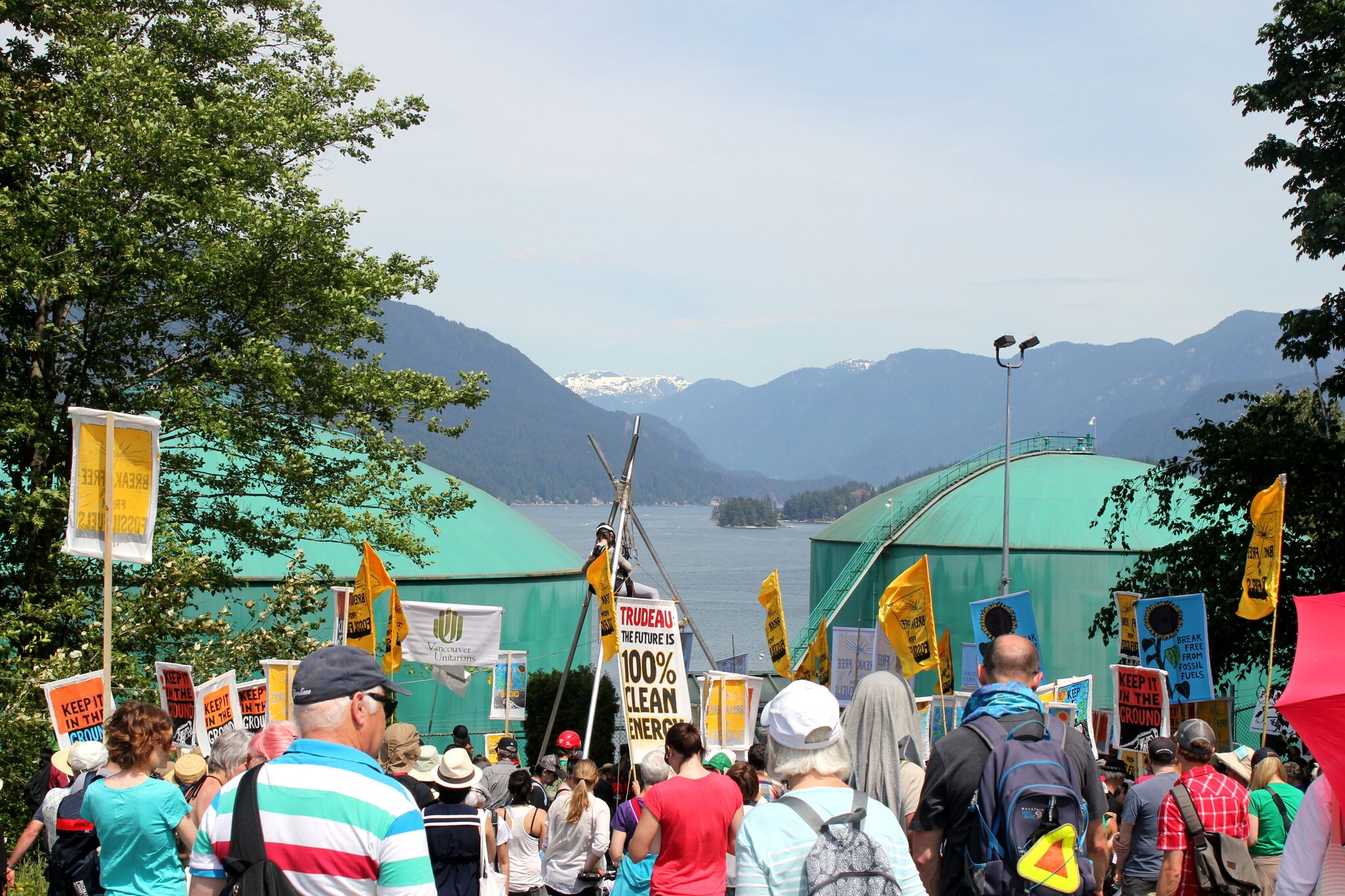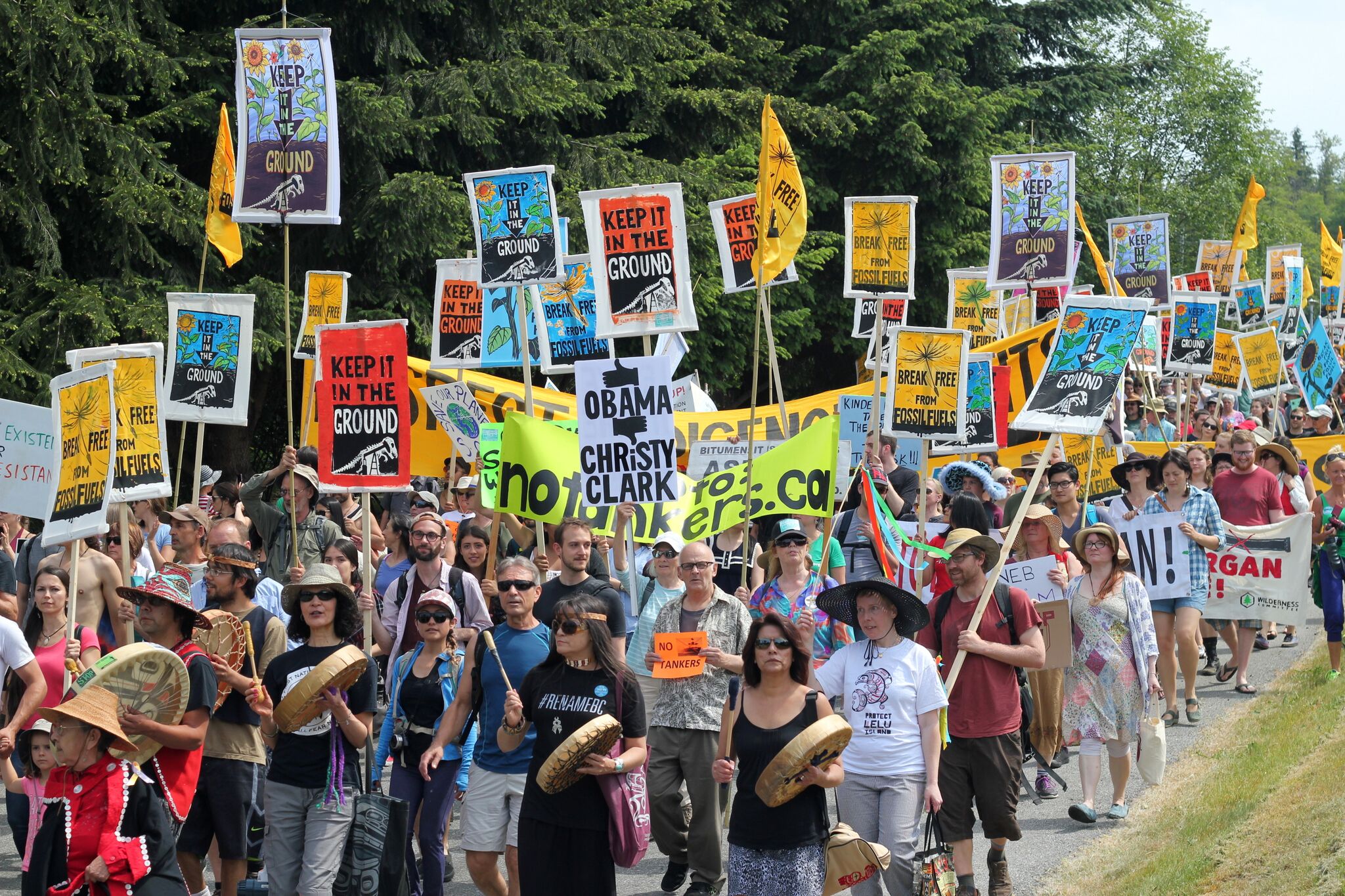Like this article? rabble is reader-supported journalism. Chip in to keep stories like these coming.
On Saturday, over 800 protesters organized by Greenpeace and 350.org surrounded Kinder Morgan facilities in Burnaby, B.C. to stand in solidarity with the international Break Free from Fossil Fuels movement.
“We have to change,” protestor Ophelia Klaus told rabble.ca. “We’re getting to a point where it’s going to be hard to come back to where we were so we need to take action now.”
While several hundred activists marched to the gates of Kinder Morgan by foot, nearly 300 kayakers approached the energy company’s facility from the water to send a strong message that civil disobedience is a tool that communities can use against the fossil fuel regime.
“The whole emphasis is just to send a really clear message to Prime Minister Trudeau that we’ve got the power, we’ve got the vision of the economy that we want to see and it doesn’t include hardwiring our economies into dirty fossil fuels,” said Clayton Thomas-Muller, member of the Mathais Colomb Cree Nation in Manitoba and campaigner with 350.org. “This is the moment where he can either be a climate leader or maintain the trajectory that Harper has put this country on.”
The movement was a part of a global week of action that saw events taking place in 12 countries around the world. In Canada, the events coincided with the upcoming release of the National Energy Board’s (NEB) recommendations for Kinder Morgan’s hotly contested Trans Mountain pipeline on Tsleil-Waututh territory.
“The way that [Break Free] manifests here in Canada is to put energy and inertia into supporting the Tsleil-Waututh assertion of their sovereignty against Kinder Morgan and against Trudeau and lift up their right to say no to this project,” said Thomas-Muller. “These aren’t a bunch of little fights, it’s all a part of the same Indigenous land, fossil fuel resistance movement and we’re all here to stand in solidarity with the Tsleil Waututh and say that this pipeline project won’t happen.”

Before the action took place on Saturday, Break Free in B.C. began with a gifting of six large solar panels to the Tsleil-Waututh community to solarize the Indigenous band’s office. Multiple action training sessions and a First Nations water protection ceremony were held for everyone participating in the protest.
While this event took place in Burnaby to shed light on Kinder Morgan’s Trans Mountain pipeline, it isn’t the only heavily debated energy project in the country. In fact, just a few weeks ago, Enbridge’s previously halted Northern Gateway project requested a three-year extension from the NEB to start construction.
If he approves the project’s request, Thomas-Muller says this could hurt Trudeau’s credibility in his commitment to fight climate change.
“[Trudeau’s] got a pretty major moment here,” he said. “If he builds any one of these pipelines, Energy East, Northern Gateway or Trans Mountain, his whole climate legacy has gone out the door before he even has a legacy.”
It’s more than Trudeau’s legacy that’s at stake though, argues Thomas-Muller. It’s the country’s economy, climate and participation in meaningful reconciliation with Indigenous peoples too.
“When we talk about Canada’s economy, when we talk about whether or not these projects are in the national interest, and when we’re negotiating the way of life of communities like the Tsleil-Waututh in conversations that are economic in design, it speaks to a larger issue of colonization in this country…this economy in its current form makes profits for shareholders of corporations operating in Canada solely based on the dispossession of Indigenous peoples from their lands,” he said.
“We’ve really got to reevaluate the kind of economic paradigm we want in this country and First Nations need to be at the centre of that rethink and that redesign if we’re ever going to bring our society to a place of equity, of justice and one that restores our place in the sacred circle of life in a balanced way.”
Alyse Kotyk is a Vancouver-based writer and editor with a passion for social justice and storytelling. She studied English Literature and Global Development at Queen’s University and is excited by media that digs deep, asks questions and shares narratives. Alyse was the Editor of Servants Quarters and has written for the Queen’s News Centre, Quietly Media and the Vancouver Observer. She is a former news intern of rabble.ca.
Photos: Alyse Kotyk



